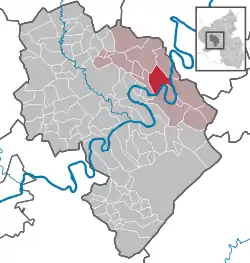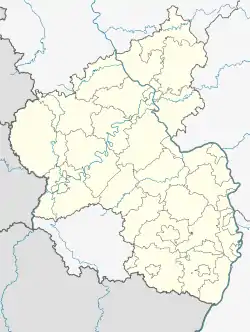Kröv
Kröv is an Ortsgemeinde – a municipality belonging to a Verbandsgemeinde, a kind of collective municipality – in the Bernkastel-Wittlich district in Rhineland-Palatinate, Germany.
Kröv | |
|---|---|
 Panorama of the municipality | |
 Coat of arms | |
Location of Kröv within Bernkastel-Wittlich district  | |
 Kröv  Kröv | |
| Coordinates: 49°58′39.42″N 7°5′4.43″E | |
| Country | Germany |
| State | Rhineland-Palatinate |
| District | Bernkastel-Wittlich |
| Municipal assoc. | Traben-Trarbach |
| Subdivisions | 2 |
| Government | |
| • Mayor | Günter Müllers (CDU) |
| Area | |
| • Total | 14.75 km2 (5.70 sq mi) |
| Elevation | 120 m (390 ft) |
| Population (2019-12-31)[1] | |
| • Total | 2,210 |
| • Density | 150/km2 (390/sq mi) |
| Time zone | UTC+01:00 (CET) |
| • Summer (DST) | UTC+02:00 (CEST) |
| Postal codes | 54536 |
| Dialling codes | 06541 |
| Vehicle registration | WIL |
| Website | www.kroev.de |
Geography
Location
The municipality lies on the Moselle between the town of Traben-Trarbach and Kinheim. Kröv is made up of the main centre, also called Kröv, and the considerably smaller outlying centre of Kövenig, lying east of the main centre and separated from it by the heights of Mont Royal. Kröv belongs to the Verbandsgemeinde of Traben-Trarbach. Before July 2014, it was the seat of the former Verbandsgemeinde of Kröv-Bausendorf.
History
The placename derives from the original Gallo-Romance croviacum, which later became a Merovingian kingly estate. The municipality’s first documentary mention came under the Carolingian king Lothair II in 862. Kröv was part of the Kröver Reich (a royal estate named for Kröv). The village belonged until 1815 to the Département de la Sarre, and after Napoleon’s final defeat, to Prussia. Since 1947, it has been part of the then newly founded state of Rhineland-Palatinate.
The Nazi and Hitler Youth leader Baldur von Schirach withdrew to Kröv after his release from prison in 1966, dying and being buried here several years later (1974). Schirach’s gravestone at the Kröv graveyard bears the epitaph “Ich war einer von euch” – “I was one of you”.
Politics
Municipal council
The council is made up of 16 council members, who were elected by proportional representation at the municipal election held on 7 June 2009, and the honorary mayor as chairman.
The municipal election held on 7 June 2009 yielded the following results:[2]
| SPD | CDU | FDP | Kövenig e.V. | Total | |
| 2009 | 2 | 7 | 6 | 1 | 16 seats |
| 2004 | 2 | 8 | 5 | 1 | 16 seats |
Culture and sightseeing
- Burggebäude St. Josef (castle building)
- St. Remigius’s Parish Church
- Parish estate
- Grabkapelle Kesselstatt (“grave chapel”)
- Dreigiebelhaus (“Three-Gable House”, a former town hall)
- Echternacher Hof (estate)
- Hof der Grauen Schwestern (“Estate of the Grey Sisters”)
- Carolingian estate
- Staffelter Hof (estate that draws its name from Stavelot in the Principality of Stavelot-Malmedy, to which it belonged for centuries and to which it was tributary)
Economy and infrastructure
Winegrowing
Winegrowing is one of Kröv’s more important industries. The vines are grown in the Ortsteile of Kröv and Kövenig on an area of some 350 ha, some of it steep-slope vineyards. The grapes grown here are overwhelmingly Riesling, although in the less steep vineyards, Müller-Thurgau, Kerner and Dornfelder are also raised.
Kröv’s vineyards belong to the winemaking appellation – Großlage – of Kröver Nacktarsch.
Education
In Kröv are one kindergarten and one primary school.
Transport
Through the municipality runs Bundesstraße 53. In the outlying centre of Kövenig is a halt on the Moselwein-Bahn (railway) on the stretch of the line between Traben-Trarbach and Bullay.
Notable People
Baldur von Schirach (1907-1974), Reichsjugendführer of Germany 1931-40 and later Gauleiter and Reichsstatthalter of Vienna, and who was a defendant at Nuremberg, died in the town.
References
- "Bevölkerungsstand 2019, Kreise, Gemeinden, Verbandsgemeinden". Statistisches Landesamt Rheinland-Pfalz (in German). 2020.
- Kommunalwahl Rheinland-Pfalz 2009, Gemeinderat
External links
![]() Media related to Kröv at Wikimedia Commons
Media related to Kröv at Wikimedia Commons
